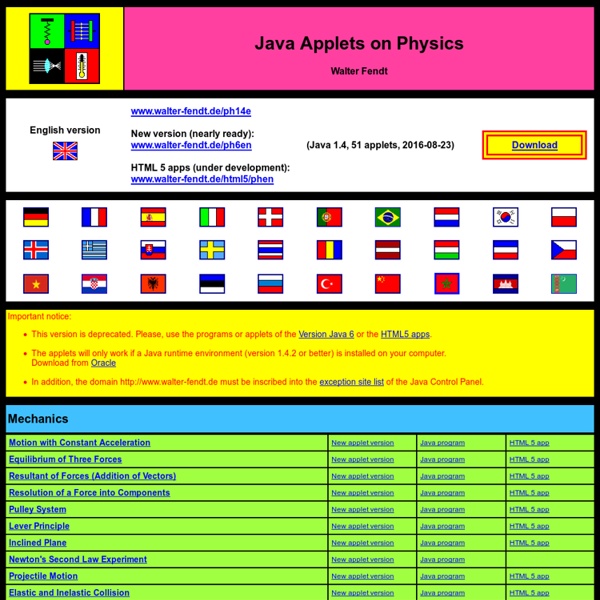



Advanced Level Physics HyperPhysics A comprehensive, physics site which has a concept maps format which makes it very easy to find information. The range of coverage of physics topics is amazing. Physics.org A searchable database of web resources from the Institute of Physics. BBC Higher Bitesize Revision Higher Bitesize is a revision site especially for those students taking the Scottish higher examinations. Light and Vision An truly comprehensive website about light and vision. Cambridge International Examinations Study Resources Cambridge University has developed this excellent support site with exam help resources. School Physics This is the website for both students and teachers of Physics whether studied as a single subject or as part of a combined science course and is useful for those in the UK studying GCSE and A level Physics. Bloodhound SSC Education Programme Socratic Practical Physics Forces
The Mechanical Universe The Mechanical Universe... And Beyond, is a 52-part telecourse filmed at the California Institute of Technology, and produced by Caltech and INTELECOM Intelligent Telecommunications (a non-profit consortium of California community colleges). The series introduces university level physics, covering topics from Copernicus to quantum mechanics. Produced starting in 1985, the videos make heavy use of historical dramatizations and visual aids to explain physics concepts. The Mechanical Universe lectures are actual freshman physics lectures from Physics 1a and 1b courses at the California Institute of Technology. The series can be purchased, or viewed by streaming (after a relatively simple and free registration) from the Annenberg website, or can be viewed on other video streaming sites such as YouTube and Google Video. List of episodes[edit] The Mechanical Universe[edit] The Mechanical Universe ...and Beyond[edit] 28. 30. 31. 32. 35. 37. 38. 39. 41. 42. 43. 44. 45. 46. 47. 48. 49. 50. 51. 52.
ΦΥΣΙΚΗ Γ΄ΛΥΚΕΙΟΥ A-level Physics Tutor revise A-level physics. Your free guide for effective physics revision. The Physics Classroom Current, Charge and Voltage Charge is a property of certain particles. A particle with charge will experience a force in an electric field (or in a magnetic field if the charge is moving). Charge is either positive or negative. Objects with a similar charge will repel. Charge is measured in coulombs, C. An electron always has a negative charge of -1.6 x 10-19 coulombs. It is not possible to destroy or create charge. You can cancel out the effect of a charge on a body by adding an equal and opposite charge to it, but you can't destroy the charge itself. Static electricity is caused by the transfer of electrons from one object to another. Static electricity is never caused by the movement of protons. The easiest way to charge an object with static electricity is by using friction. Current electricity is about moving charged particles. Current is the rate of flow of charge; it is the amount of charge flowing per second through a conductor. The equation for calculating current is: Where: I = current (amperes, A) I = vAnq
A-level Physics (Advancing Physics) A-level Physics (Advancing Physics) From Wikibooks, open books for an open world Welcome to the Wikibooks textbook on Physics, designed to contain everything you need to know for the OCR Physics B (Advancing Physics) specification[1]. All sorts of useful documents for this specification are available at . All units are assumed to be SI units, unless stated otherwise. Chapters are probably marked as 75% complete ( ) because they are complete, but may require some attention. Contents Subjects: Hidden categories: Navigation menu Personal tools Namespaces Views Navigation Community Tools Languages Sister projects Print/export This page was last modified on 8 July 2014, at 07:48.
Advancing Physics A Level Physics | Videos A Level Physics Online Home Videos Resources Masterclasses About More contact@alevelphysicsonline.com Year 13 material now here! Video Tutorials Quantities and Units Scalars and Vectors Waves The essentials you need to know to understand the rest of Physics. What is the difference between speed and velocity? A large topic that extends your GCSE knowledge considerably. Motion All about how objects move. Work, Energy and Power All about the motion of objects. Quantum Physics This is where it gets really interesting. Newton's Laws Hundreds of years old but still incredibly useful. Forces Looking at both the net force on an object and also cases of equilibrium. Electricity A topic that many find suprisingly tricky - but it doesn't have to be that way. These are the 200+ videos that I have made covering the content for both Year 12 and Year 13 as well as the new Practical Endorsement. Behaviour of Materials The basics that mechanical engineering is built on Thermal Physics Circular Motion Round and round... Capacitors